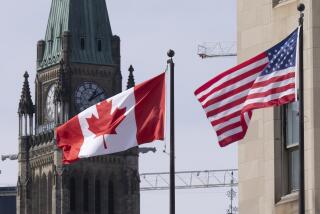As seen through tourists’ eyes, U.S. can be dangerous
- Share via
Oh wad some power the giftie gie us
to see oursel’s as others see us!
It wad frae monie a blunder free us,
An’ foolish notion. -- Robert Burns, “To a Louse,” 1786
*
The fearful U.S. traveler has memorized a catalog of dangers abroad, from terrorism to crime to scams. More than ever, in these uncertain times, it’s only natural to worry about safety when we go far from home.
When I last checked, the U.S. State Department was warning us to avoid or exercise caution in 45 countries for various reasons -- excluding a long-standing “worldwide caution” that alerts us to be careful everywhere. The country list included obvious hot spots, such as Israel and Afghanistan, but also popular tourist destinations such as India, Turkey and Venezuela.
This list started me wondering: What do other nations tell their citizens about traveling to the U.S.? So I checked into it. The results were enlightening.
It turns out that foreigners here worry about the same things we do when we’re abroad, plus earthquakes, bad roads, puritanism and other hazards.
Seeing ourselves as others see us could prevent a blunder or two, as poet Burns suggests, when tooling around our own country -- or simply disabuse us of the “foolish notion” that America is an island of safety in a dangerous world.
Here are some excerpts from official government advice about visiting America, from Internet sites of the Australian Department of Foreign Affairs and Trade, the British Foreign & Commonwealth Office, the Canadian Department of Foreign Affairs and International Trade, and the French Ministry of Foreign Affairs. (Internet addresses are listed below.)
Terrorism: Explaining that the FBI “continues to warn of potential terrorist attacks against U.S. economic interests,” Australia advises its citizens “to be especially alert to their own security” in the U.S. Britain has a similar caution.
Crime and scams: France also mentions terrorist threats but says the main risk in visiting America is crime, which it says is increasing after falling for eight years. Citing an elevated risk of bank card fraud, it advises using cash for small purchases.
Canada’s site says: “Crime is high in many U.S. cities but is generally concentrated in areas that travelers are unlikely to visit. However, travelers should remain alert to their surroundings as street crime can spill over into commercial, hotel and entertainment areas.” It adds that “racial tensions and poverty can occasionally prompt riots.”
Risky places: France identifies what it views as risky areas of major U.S. cities. In Los Angeles, for instance, it says large areas should be avoided, including Watts, Inglewood and Florence. It advises caution downtown; in heavily touristed areas such as Hollywood, Santa Monica and Venice; and in Westside residential areas, where it says thefts, carjackings and burglaries are frequently reported.
Canada devotes separate sections to Florida and Hawaii.
For Florida, it says, “Attacks on tourists have decreased, but violent crime remains a serious concern.” It adds: “Theft is increasing, particularly from trunks of parked cars in the North Miami Beach area, South Beach and at airports.” (Florida’s rate of violent crime has decreased over the last 10 years, according to state figures.)
Of Hawaii, it says, visitors should “drive defensively, as road conditions may be different from those in Canada. Traffic accidents are a common cause of death and injury.” (In fact, Hawaii’s traffic fatality rate was only slightly higher than Canada’s, 1.7 versus 1.6 per 10,000 registered vehicles in 2000, the most recent data available.)
Health and safety: France offers its citizens a tutorial on avoiding shark attacks in the U.S.: Swim between 8 a.m. and 6 p.m., don’t wear sparkly swimsuits, avoid surfers and do not swim when you have a wound.
Noting that “a small number of people in the USA have contracted West Nile virus,” Britain advises staying indoors at dawn and dusk, avoiding areas near standing water and wearing long-sleeved shirts. It also says: “Medical treatment can be very expensive; there are no special arrangements for British visitors.”
Weather and earthquakes: Our weather is worrisome, to judge from advice given to foreigners. France says the risks of natural catastrophe and violent weather are much greater in the U.S. than in Europe. It’s an interesting statement considering that the Continent recently had record floods.
France suggests checking the forecast before heading for a national park, and reviewing earthquake instructions found in California hotel rooms.
In its section on Florida, Canada urges its citizens to monitor weather reports during hurricane season, June to November.
Beachwear: Leave it to the French to fret over fashion. Their government says Americans are tolerant about clothing but forbid even little girls to wear a monokini -- the topless bikini invented in the ‘60s by designer Rudi Gernreich. Further, children must wear swimsuits and must use toilets corresponding to their gender.
Mon Dieu! You can almost hear the French exclaim. Those crazy Americans!
To read more, visit these Internet sites: www.dfat.gov.au/zw-cgi/view/Advice/United
_States_of_America (Australia); www.fco.gov.uk (Britain; select “Travel” under “Services” on the home page, then “United States” from the drop-down menu “Please Select a Country”); www.voyage.gc.ca /destinations (Canada; select “English,” then “United States” from the “Travel Reports” drop-down menu above the map); www.france.diplomatie.fr (France; select “Conseils aux Voyageurs,” then “Etats-Unis” from the drop-down menu “Destinations par liste alphabetique.” In French only.)
*
Jane Engle welcomes comments but cannot respond individually to letters and calls. Write Travel Insider, Los Angeles Times, 202 W. 1st St., Los Angeles, CA 90012, or e-mail [email protected].
More to Read
Sign up for The Wild
We’ll help you find the best places to hike, bike and run, as well as the perfect silent spots for meditation and yoga.
You may occasionally receive promotional content from the Los Angeles Times.






